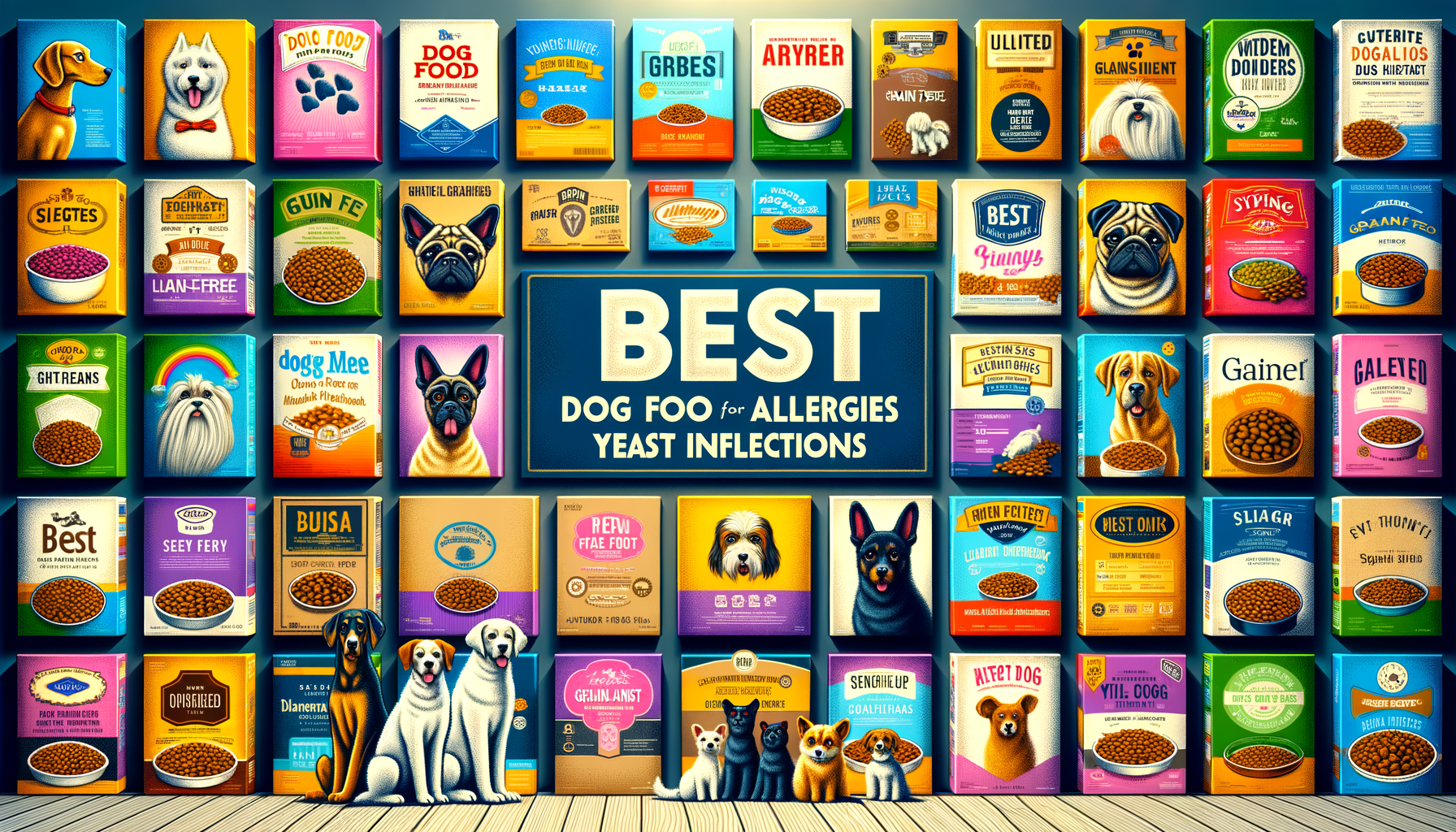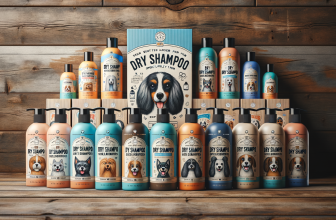
Is your furry friend itching more than usual or suffering from recurring yeast infections? If so, it might be time to consider that the culprit could very well be their diet. Many dogs are prone to food allergies and sensitivities that can manifest as skin issues or other health problems. Searching for the right dog food to combat allergies and yeast infections can feel like a daunting task, but armed with the right information, you can make an informed choice that will leave your pup feeling happy and healthy.
Our Top Picks
Our #1 Top Pick: Blue Buffalo Basics Limited Ingredient Diet
The Blue Buffalo Basics Limited Ingredient Diet is specifically designed for dogs with food sensitivities. It uses a single animal protein source, which for many options is real turkey, combined with digestible carbohydrates like pumpkin and potato. What sets this product apart is the inclusion of LifeSource Bits—a unique blend of antioxidants, vitamins, and minerals to support immune health, life stage requirements, and a healthy oxidative balance. This grain-free formula helps in reducing the potential for allergic reactions and does not contain common triggers like chicken, beef, corn, wheat, soy, dairy, or eggs.
Pick #2: Canidae PURE Grain-Free Limited Ingredient Diet
Canidae PURE is another excellent choice for dogs with allergies and yeast infections. The grain-free limited ingredient diet reduces exposure to possible allergens with a focus on using fewer, whole food ingredients. Its simple recipes include 7-10 key ingredients, providing a balanced and nutrient-rich meal with probiotics for a healthy digestion, antioxidants for a healthy immune system, and omega-6 and omega-3 fatty acids to promote beautiful skin and coat. It’s also devoid of additives that could trigger allergies or yeast overgrowth.
Pick #3: The Honest Kitchen Grain-Free Dog Food
When it comes to minimizing the risk of allergies and yeast infections in dogs, The Honest Kitchen offers a dehydrated grain-free food that’s made with human-grade ingredients, ensuring the highest quality and safety standards. It’s primarily made with free-range chicken and includes no by-products, preservatives, or GMO ingredients—common elements that could exacerbate allergies and yeast problems.
Pick #4: Wellness Simple Limited Ingredient Diet Grain-Free
Wellness Simple Limited Ingredient Diet Grain-Free offers a holistic approach to dog food designed for pets with allergies or intolerances. It contains a single source of protein and easily digestible carbohydrates, without extra fillers or additives that could irritate your dog’s system. Furthermore, it includes prebiotics and probiotics to maintain a healthy gut, which is essential for controlling yeast overgrowth.
Pick #5: Instinct Limited Ingredient Diet Grain-Free Recipe with Real Meat
Instinct’s Limited Ingredient Diet is a grain-free and gluten-free option perfect for dogs that need a simplified diet that doesn’t compromise on nutrition. Featuring one animal protein and one vegetable, it excludes dairy, eggs, chicken, beef, fish, sweet potato, chickpeas, corn, wheat, and soy to reduce the possibility of allergic reactions. It also uses a freeze-dried raw coating to provide raw nutrition and great taste.
What to Know Before You Buy
- Understand Allergens & Yeast Triggers: Certain ingredients in dog foods can be common triggers for allergies and yeast infections, such as beef, dairy, chicken, or wheat. Learning which of these your dog reacts to can help in selecting the best dog food.
- Proteins: Single-source, novel animal proteins (like duck, venison, or fish) are frequently recommended for allergy-prone dogs, as they are less likely to cause an adverse reaction.
- Simple Is Better: Foods with a shorter ingredient list can help you identify and avoid allergens as well as unnecessary fillers.
- Grain-Free Options: While not all dogs are sensitive to grains, those with allergies often benefit from a grain-free diet.
- Probiotics and Prebiotics: A healthy gut flora can help manage and prevent yeast overgrowth, so look for foods that support digestive health.
- Omega Fatty Acids: These are crucial in maintaining skin health and can help in preventing yeast infections on the skin.
Factors to Consider Before Buying
- Ingredient Quality: High-quality, whole food ingredients are typically better digested and less likely to cause irritation.
- Formulation: Ensure the dog food formula is complete and balanced for your dog’s life stage and health condition.
- Reputable Brand: Purchasing from a reputable brand helps ensure that the food has been produced under strict quality controls.
- Your Dog’s Preferences: Consider your dog’s taste preferences and any previous positive or negative reactions to certain foods.
- Consultation with Veterinarian: Always consult with a vet before transitioning to a new diet, especially if allergies or yeast infections are a concern.
Why Trust ChooseRight?
At ChooseRight, we meticulously review products with your pet’s well-being in mind. We’ve poured over thousands of reviews and engaged with professionals in the field to ensure our recommendations are grounded in experience and real-world results. Our in-depth analysis of ingredients, brand reputation, and the efficacy of the dog foods in managing allergies and yeast infections has been synthesized to provide you with trustworthy guidance. By choosing recommendations that prioritize the health and happiness of your pet, we help you make the best choice for your canine companion.
Finishing Thoughts
Detailing the best dog food for allergies and yeast infections isn’t just about listing our top picks, it’s about equipping you with the knowledge and insight to make decisions that will enhance your dog’s quality of life. Remember that each dog is unique, and what works for one may not work for all. Always pay close attention to your pet’s reaction to a new food and consult with your vet to ensure it’s the right fit for their specific health needs. By selecting the right diet, you’re not just feeding your dog—you’re nurturing their entire well-being.
Frequently Asked Questions
What causes allergies and yeast infections in dogs?
Allergies in dogs can be triggered by a variety of factors including environmental allergens, fleas, and food ingredients. Yeast infections often develop in the warm, moist areas of a dog’s body, such as the ears or paws, and can be secondary to allergic conditions, immune system disorders, or an imbalance in the skin’s natural flora.
How can diet affect my dog’s allergies or yeast infections?
Diet can play a significant role in the management of your dog’s allergies and yeast infections. Some ingredients commonly found in dog food, like certain proteins, grains, or additives, might exacerbate these conditions. A diet tailored to avoid or reduce potential allergens can help relieve symptoms and prevent recurrence.
What should I look for in a dog food for allergies and yeast infections?
Look for dog foods that are labeled as hypoallergenic, limited ingredient, or novel protein. These diets often exclude common allergens such as beef, chicken, corn, wheat, soy, and dairy. Furthermore, a formula with a balance of omega-3 and omega-6 fatty acids can help maintain skin health, and the inclusion of probiotics can support a healthy gut flora to combat yeast overgrowth.
Can grain-free diets help dogs with allergies and yeast infections?
Grain-free diets can be beneficial for some dogs with allergies, as grains are potential allergens. However, it’s important to understand that grain-free doesn’t necessarily mean the diet is right for all allergic dogs or those with yeast infections. Some grain-free diets might contain other ingredients that can trigger a dog’s allergies.
Are there any specific ingredients to avoid in dog food when dealing with allergies and yeast infections?
Yes. It’s typically advised to avoid ingredients that are known to be common allergens for dogs—such as beef, dairy, wheat, corn, and soy—as well as artificial colors, flavors, and preservatives. Also, ingredients high in starches and sugars can promote yeast growth, so these should be minimized.
How long does it take to see an improvement after changing my dog’s diet?
Improvement in allergy or yeast infection symptoms can occur within a few weeks of dietary changes, but it might take up to 8-10 weeks or longer for the full benefits to be observed. It’s important to follow your veterinarian’s recommendations and to be consistent with the new diet to see effective results.
Should I consult a veterinarian before changing my dog’s diet?
Yes, it’s always a good idea to consult with a veterinarian before making any changes to your dog’s diet, especially if your dog has allergies or yeast infections. A veterinarian can provide a proper diagnosis, suggest an appropriate diet, and help you monitor your dog’s progress.
Are prescription diets better than over-the-counter dog foods for allergies and yeast infections?
Prescription diets are formulated to address specific health conditions and are often recommended for dogs with severe allergies or persistent yeast infections. They can be more effective than over-the-counter foods, but many high-quality, commercial diets are also available and may be suitable, depending on your dog’s particular needs and severity of the condition.
Is it possible to treat dog allergies and yeast infections with homemade diets?
Yes, some pet owners opt to prepare homemade diets for their dogs with allergies and yeast infections under the guidance of a veterinarian or a veterinary nutritionist. This allows for complete control over the ingredients used. However, formulating a balanced diet at home requires knowledge and care to ensure your dog receives all the necessary nutrients.
Can probiotics and supplements help with canine allergies and yeast infections?
Probiotics can help support a healthy gut environment, which might aid in the management of yeast infections by keeping yeast levels in check. Supplements like omega-3 fatty acids may help improve skin barrier function and reduce inflammation associated with allergies. Always consult your vet before adding any supplements to your dog’s diet.







